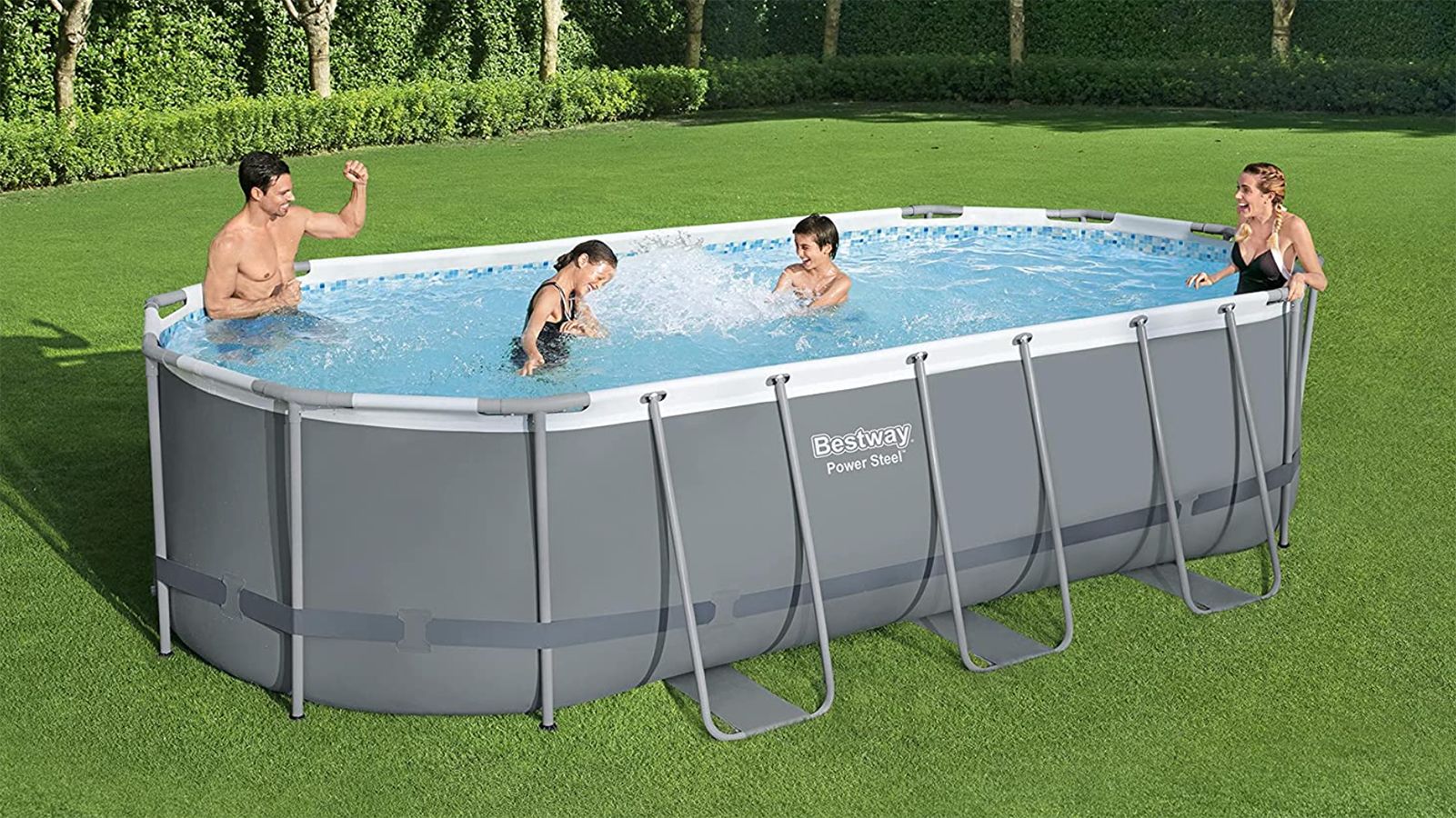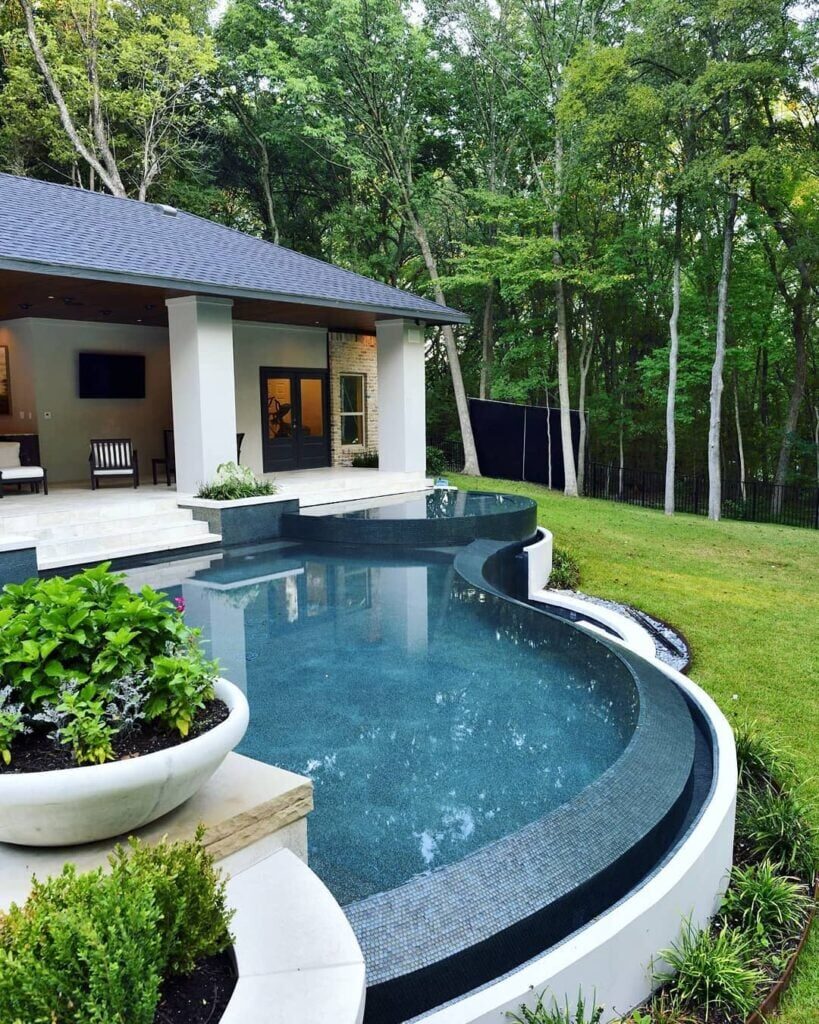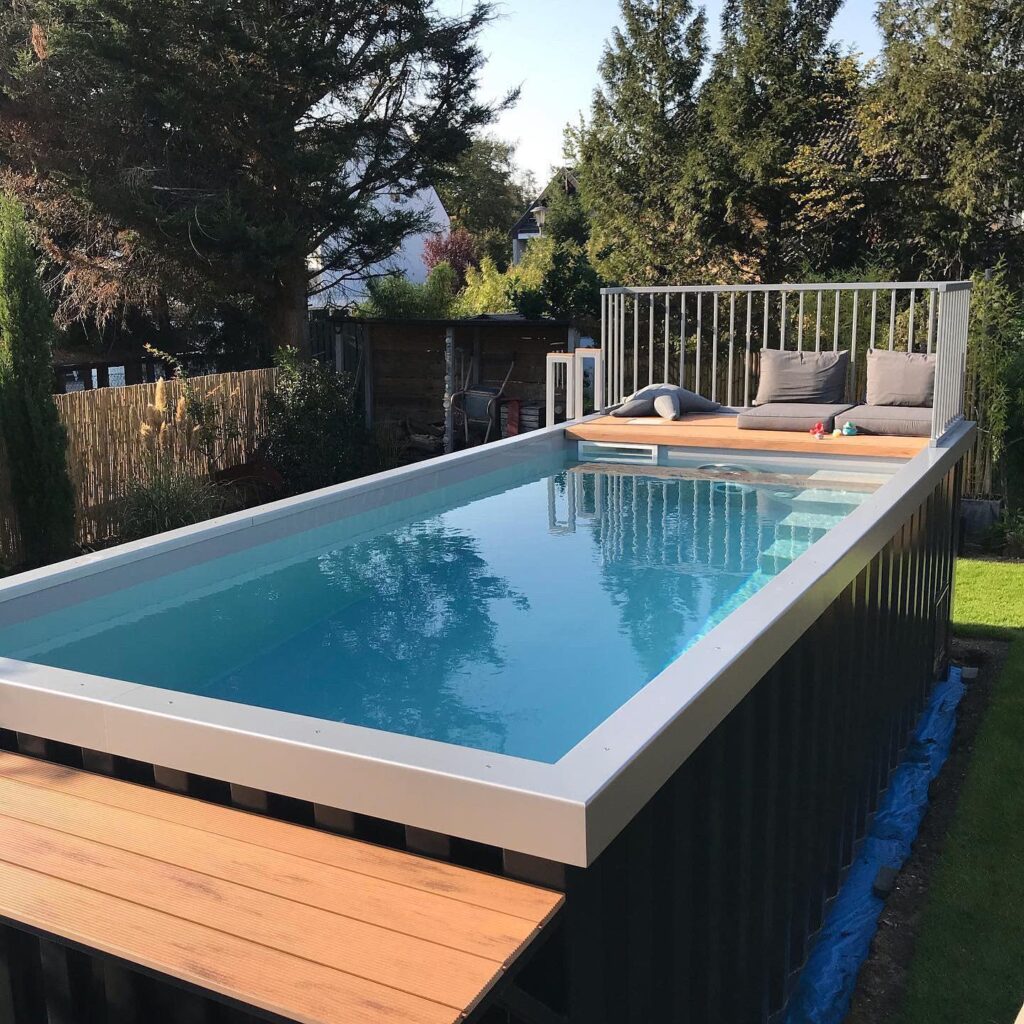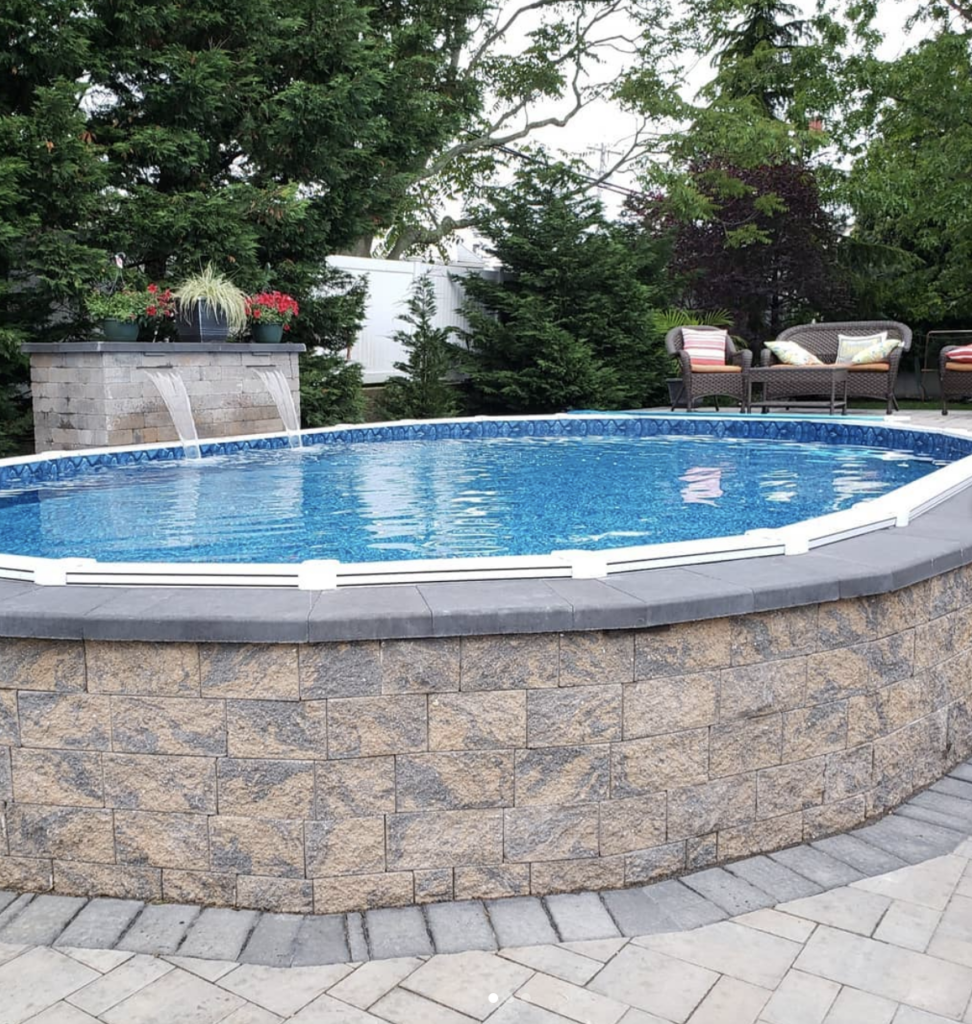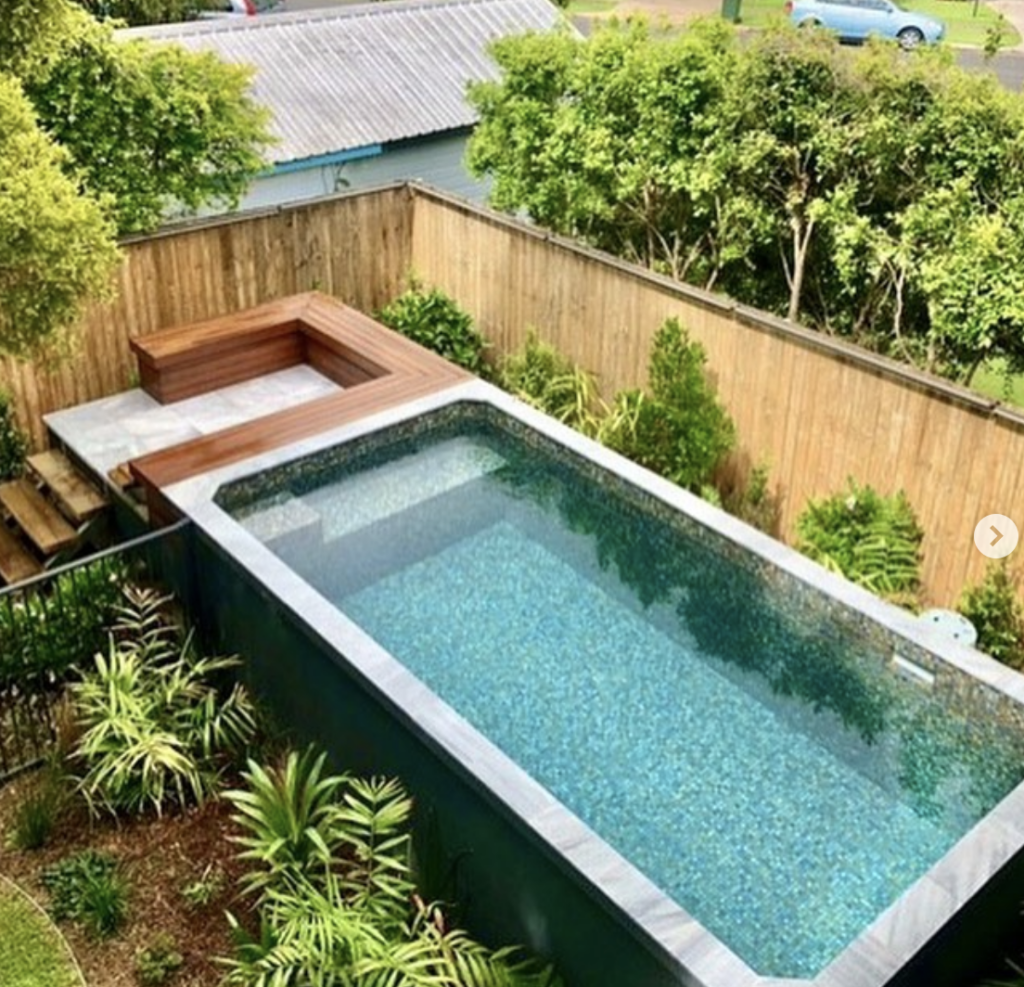Imagine transforming your backyard into a luxurious oasis without breaking the bank. In our guide, “Above Ground Pools: A Budget-Friendly Guide To Backyard Luxury,” we will explore the affordable and stunning world of above ground pools. Discover how these pools can elevate your outdoor living space, provide endless hours of fun and relaxation for the whole family, and most importantly, fit within your budget. Whether you’re a first-time pool owner or ready to upgrade your current setup, get ready to dive into the world of above ground pools and create your very own backyard paradise.
This image is property of www.nikkisplate.com.
Benefits of Above Ground Pools
Affordability
One of the significant advantages of above ground pools is their affordability. Unlike in-ground pools, which can cost tens of thousands of dollars to install, above ground pools are a much more cost-effective option. From the initial purchase price to the installation and maintenance costs, owning an above ground pool is a budget-friendly choice for homeowners looking to enhance their backyard.
Ease of Installation
Installing an above ground pool is a straightforward process that can be completed in a relatively short amount of time. With the help of a few friends or family members, you can have your pool up and running in a matter of days. The ease of installation is due to the design and construction of above ground pools, which typically do not require extensive excavation or intricate plumbing. This simplicity not only saves you time but also reduces the amount of labor and associated expenses.
Portability
Another advantage of above ground pools is their portability. Unlike in-ground pools, which are immovable, above ground pools allow you the flexibility to relocate your pool if you ever decide to move. This portability is especially beneficial for those who may be renting their home or who simply want the freedom to change the layout of their outdoor space. Additionally, if you need to take down your pool for any reason, it can be disassembled and stored until you’re ready to set it up again.
Variety of Sizes and Shapes
Above ground pools come in a wide range of sizes and shapes, allowing you to find the perfect fit for your backyard. Whether you have limited space or a large area to work with, there is an above ground pool that can accommodate your needs. From small round pools suitable for children to oval or rectangular pools that can accommodate multiple swimmers, the variety of options ensures that you can find the ideal pool size and shape to suit your preferences.
Types of Above Ground Pools
Steel Frame Pools
Steel frame pools are a popular choice among homeowners due to their durability and strength. These pools are constructed with a sturdy steel frame that provides stability and support, ensuring the pool maintains its shape even when filled with water. The steel frame is often coated with a protective finish to prevent rust and corrosion, extending the lifespan of the pool. Steel frame pools are available in various sizes and shapes, making them suitable for different backyard spaces.
Resin Frame Pools
Resin frame pools are an alternative option to steel frame pools. These pools are constructed using a combination of resin and metal components. The resin material provides excellent resistance to corrosion and can withstand harsh weather conditions. Resin frame pools are known for their longevity and low maintenance requirements. Additionally, the use of resin in the construction of these pools eliminates the possibility of rusting, making them an ideal choice for those living in coastal areas or regions with high humidity levels.
Inflatable Pools
Inflatable pools offer a convenient and portable option for those looking to have a pool without the commitment of a permanent installation. These pools are made from durable PVC material that can withstand the weight of water and the activities of swimmers. Inflatable pools are easy to set up and can be inflated using a pump or an air compressor. While they may be smaller in size compared to steel or resin frame pools, inflatable pools are a cost-effective solution for families or individuals with limited space or those who want a temporary pool option.
Factors to Consider Before Buying an Above Ground Pool
Available Space
Before purchasing an above ground pool, it’s essential to assess the available space in your backyard. Consider the dimensions of the pool, including its width, length, and height, to ensure it fits comfortably within your outdoor area. Measure the area where you plan to install the pool, accounting for any additional clearance needed for safety requirements. Taking accurate measurements will help you choose a pool that maximizes your available space while still leaving room for other outdoor activities or landscaping.
Budget
Determining your budget is another crucial factor to consider when buying an above ground pool. The cost of the pool will vary depending on factors such as size, shape, materials used, and additional features. It’s important to set a budget and stick to it while considering the long-term costs associated with owning a pool, such as maintenance and utility expenses. By having a clear budget in mind, you can narrow down your options and find a pool that meets your needs without exceeding your financial limits.
Materials and Durability
Consider the materials used in the construction of the pool and their durability when making your purchase decision. Steel frame pools are known for their strength and longevity, while resin frame pools offer exceptional resistance to corrosion and weathering. Inflatable pools, although not as durable as their frame counterparts, can still provide ample enjoyment when properly cared for. Assess your specific needs, taking into account factors such as local climate and usage frequency, to choose a pool that will withstand the test of time.
Maintenance Requirements
All pools require regular maintenance to ensure clean and safe swimming conditions. Before buying an above ground pool, it’s crucial to understand the maintenance requirements associated with each pool type. Steel and resin frame pools generally have more complex maintenance needs, including proper cleaning, chemical balance, and filter maintenance. Inflatable pools, on the other hand, may have simpler maintenance requirements but still require regular cleaning and water treatment. Consider your ability and willingness to perform the necessary maintenance tasks when deciding which type of pool is best suited for you.
Safety Features
When selecting an above ground pool, prioritize safety features that will provide peace of mind for you and your family. Look for options such as sturdy pool ladders or steps with nonslip surfaces, which make entering and exiting the pool safer. Consider adding safety alarms and pool covers to help prevent accidents, particularly if you have young children or pets. Also, ensure that the pool you choose complies with local safety regulations and guidelines to minimize the risk of accidents or injuries.
Choosing the Right Size and Shape
Considering Space Constraints
When choosing the size and shape of your above ground pool, it’s important to consider any space constraints in your backyard. Measure the available area and consider other factors such as proximity to existing structures, trees, or utility lines. You want to ensure that the pool will fit comfortably within the designated space without obstructing any pathways or impeding on other outdoor activities. Take into account any zoning or building restrictions in your area to avoid potential issues after installation.
Determining Pool Capacity
Determining the pool capacity is essential to ensure that the pool can accommodate the number of swimmers you expect. Consider the size of your family or the average number of guests you anticipate having in the pool at any given time. Pool capacity is typically measured in terms of gallons or number of people. Keep in mind that larger pools may require more maintenance and higher water usage, so finding the right balance is crucial.
Popular Pool Shapes
Above ground pools come in various shapes, each offering its own unique benefits and aesthetic appeal. The most common pool shapes include round, oval, and rectangular. Round pools are a popular choice due to their ease of installation and affordability. They also provide a more social atmosphere as swimmers are closer together. Oval pools are ideal for those with more narrow backyard spaces as they can be placed closer to fences or structures. Rectangular pools are often associated with a more classic and elegant look and are suitable for those who enjoy swimming laps or engaging in water-based fitness activities. Consider your personal preferences and the overall aesthetic of your backyard when choosing the shape of your above ground pool.
This image is property of www.nikkisplate.com.
Installation Process
Selecting a Suitable Location
Choosing the right location for your above ground pool is crucial for a successful installation. Look for a flat and level area in your backyard, free from any obstructions such as rocks, tree roots, or utility lines. Avoid placing the pool under trees or in areas prone to excessive shade, as this can affect the water quality and increase the risk of debris falling into the pool. Additionally, consider the proximity to your home for easy access and supervision.
Preparing the Ground
Before assembling your above ground pool, it’s important to prepare the ground properly. Remove any grass, weeds, or rocks from the area to create a smooth surface. Level the ground using a suitable tool, such as a builder’s level or a laser level, to ensure an even base for the pool. This step is crucial as an uneven surface can lead to structural issues and affect the overall stability of the pool.
Assembling the Pool
Once the ground is properly prepared, you can begin assembling your above ground pool. Follow the manufacturer’s instructions that accompany your pool kit, as each pool may have specific assembly requirements. Start by assembling the pool walls and frame, ensuring that all components are securely in place. Then, install the pool liner, making sure it is aligned correctly and free from any wrinkles or air pockets. Finally, attach any additional features such as skimmers, return jets, or lights as specified by the manufacturer.
Filling and Leveling the Pool
After the pool is fully assembled, it’s time to fill it with water. Use a garden hose or a water delivery service to fill the pool to the recommended level. As the pool fills, periodically check the water level to ensure it remains even and adjust accordingly. Once the pool is filled, use a pool level or a long straight object to ensure that the water surface is level all around. This step is vital to maintain the structural integrity of the pool and ensure a safe swimming environment.
Pool Accessories and Essentials
Pool Covers
A pool cover is a must-have accessory for any above ground pool owner. A cover helps keep debris, leaves, and insects out of the pool, reducing the amount of cleaning and maintenance required. Pool covers also help retain heat and reduce water evaporation, ultimately saving on heating and water costs. There are various types of pool covers available, including solar covers, winter covers, and safety covers. Choose the one that best suits your needs and climate conditions.
Filtration Systems
Proper filtration is essential for maintaining clean and clear water in your above ground pool. Invest in a high-quality filtration system that is designed specifically for the size of your pool. There are different types of filtration systems available, including sand filters, cartridge filters, and diatomaceous earth (D.E.) filters. Each type has its own advantages and maintenance requirements, so choose the one that best fits your needs and budget.
Cleaning Equipment
To keep your above ground pool in pristine condition, you’ll need the right cleaning equipment. Invest in a pool skimmer to remove leaves, insects, and debris from the water’s surface. A pool brush is essential for scrubbing the pool walls, steps, and floor to remove any algae or dirt buildup. A pool vacuum or automatic pool cleaner can help effectively remove fine particles and dirt from the pool’s bottom. Having the necessary cleaning equipment on hand will make the maintenance process easier and more efficient.
Pool Ladders and Steps
Safety should be a top priority when it comes to owning an above ground pool. Installing a sturdy pool ladder or steps provides easy access in and out of the pool, reducing the risk of accidents or injuries. Consider pool ladders with nonslip surfaces and handrails for added stability. Choose a ladder or steps that are specifically designed for above ground pools to ensure proper fit and compatibility.
Safety Alarms
For added peace of mind, consider installing safety alarms around your above ground pool. Safety alarms can detect movement or changes in water pressure, alerting you to potential accidents or unauthorized access to the pool area. There are various types of safety alarms available, including gate alarms, door alarms, and floating alarms. Choose the one that best suits your needs and provides an extra layer of protection for you and your family.
This image is property of www.nikkisplate.com.
Maintenance Tips for Above Ground Pools
Water Chemistry and Testing
Maintaining proper water chemistry is crucial for the overall cleanliness and safety of your above ground pool. Regularly test the water using a pool testing kit to ensure the chemical balance is within the recommended levels. Adjust the pH, alkalinity, and sanitizer levels as needed to prevent issues such as algae growth or waterborne illnesses. Follow the manufacturer’s instructions for any pool chemicals used and consider consulting a pool professional for guidance if needed.
Regular Cleaning and Vacuuming
To keep your above ground pool clean and inviting, it’s important to establish a regular cleaning routine. Use a skimmer net or pool vacuum to remove debris from the water’s surface and bottom. Brush the pool walls, steps, and floor at least once a week to prevent algae buildup. Additionally, regularly clean or backwash the pool filter to ensure it operates optimally and maintains proper circulation.
Filter Maintenance
The pool filter plays a crucial role in removing impurities from the water. Regular maintenance of the filter is necessary to keep it in good working condition. Backwash or rinse the filter as needed to remove accumulated debris and dirt. Depending on the type of filter, it may require periodic cleaning or replacement of filter media. Follow the manufacturer’s instructions for proper filter maintenance to ensure efficient operation and prolong the lifespan of the filter.
Winterization
If you live in an area with colder temperatures, it’s important to properly winterize your above ground pool to protect it from freezing and potential damage. Start by thoroughly cleaning the pool and adjusting the water chemistry. Lower the water level below the skimmer and return lines to allow for expansion. Drain and remove any water from the filter and pump system. Cover the pool with a properly fitted winter cover to prevent debris from entering the pool. Following a winterization checklist or consulting a pool professional can help ensure that your pool remains in good condition during the winter months.
Enhancing the Pool Area
Decking and Patio Options
Creating a functional and aesthetically pleasing pool area can be achieved by adding decking or patio options. A pool deck or patio provides a designated space for lounging, sunbathing, and outdoor furniture placement. Consider materials such as wood, composite, or concrete for your decking or patio, taking into account factors such as durability, maintenance requirements, and overall aesthetic appeal.
Landscaping Ideas
Enhance the visual appeal of your above ground pool by incorporating landscaping elements. Planting flowers, shrubs, or trees around the pool area can provide shade, privacy, and a pleasing backdrop. Consider using native plants or ones that are suitable for your climate conditions, as they tend to thrive with minimal effort. Additionally, adding potted plants, hanging baskets, or decorative rocks can further enhance the overall aesthetic of the pool area.
Outdoor Lighting
Extend the usability of your pool area by adding outdoor lighting. Properly placed lighting fixtures not only provide visibility and safety but also create a welcoming ambiance for evening swims or gatherings. Consider options such as solar-powered lights, LED string lights, or pathway lighting to illuminate the pool area. Choose lighting fixtures that are designed for outdoor use and are resistant to weather conditions.
Furniture and Decor
Complete the look of your pool area with suitable furniture and decor. Invest in comfortable loungers, chairs, and tables to create a relaxing atmosphere for sunbathing or socializing. Opt for weather-resistant materials that can withstand exposure to sunlight and water. Consider incorporating umbrellas, outdoor rugs, or decorative accents such as cushions, throw pillows, or artwork to personalize the pool area and make it feel more inviting.
This image is property of www.nikkisplate.com.
Budget-Friendly Pool Maintenance
DIY Cleaning and Maintenance
Performing regular cleaning and maintenance tasks yourself can help save on costs associated with professional services. Get into a routine of skimming the pool, vacuuming the bottom, and brushing the walls to prevent the buildup of debris and algae. Keep an eye on the water chemistry by testing it regularly and adjusting the chemical levels as needed. By staying proactive and addressing issues promptly, you can minimize the need for costly repairs or extensive cleaning down the line.
Using Pool Covers and Solar Blankets
Investing in a pool cover or solar blanket is a budget-friendly way to reduce maintenance and operating costs. Pool covers can prevent debris from entering the pool, reducing the amount of cleaning required. They also help retain heat and minimize water evaporation, thereby reducing heating and water replacement costs. Solar blankets, specifically, harness the power of the sun to heat the pool during the day and insulate it during the night, making them an energy-efficient option.
Energy-Efficient Filtration Systems
Consider upgrading to an energy-efficient filtration system to save on utility costs. Variable-speed pumps, for example, allow you to adjust the pump’s speed and energy consumption based on the needs of your pool. They operate at lower speeds during regular filtration cycles, resulting in significant energy savings. LED pool lights are another energy-efficient option that can reduce electricity costs while still providing ample illumination.
Conserving Water
Water conservation is not only beneficial for the environment but can also reduce your water bill. Implementing simple practices can help minimize water waste. Avoid overfilling the pool and consider using a pool cover to reduce evaporation. Repair any leaks immediately, as even minor leaks can result in significant water loss over time. Additionally, schedule regular maintenance tasks such as backwashing the filter and vacuuming to maximize the cleanliness of the water without unnecessary water wastage.
Tips for Extending the Pool Season
Solar Heating Systems
Extend your pool season by installing a solar heating system. Solar panels or solar collectors can harness the sun’s energy to heat the pool water, allowing you to enjoy comfortable swimming temperatures for a longer period. Solar heating systems are environmentally friendly and can significantly reduce heating costs compared to traditional gas or electric heaters. Consider the size of your pool and the regional climate when determining the number and size of solar panels needed.
Pool Enclosures and Dome Covers
Pool enclosures or dome covers provide an enclosed space around the pool, shielding it from outside elements such as wind, rain, and leaves. They act as a barrier to retain heat, making it possible to use the pool even in cooler weather. Pool enclosures can be retractable or permanent, providing flexibility depending on your needs. They also offer the added benefit of increased safety and privacy.
Windbreaks and Privacy Screens
Creating windbreaks or installing privacy screens can help extend the pool season by reducing the impact of wind chill and providing protection from gusty breezes. Windbreaks can be in the form of hedges, fences, or specially designed barriers that deflect wind away from the pool area. Privacy screens not only offer protection from wind but also create a more intimate and secluded space for swimming and relaxation.
Portable Electric Heaters
Portable electric heaters offer a convenient and cost-effective solution for extending the pool season. These heaters can be easily moved around as needed and provide instant heat to raise the water temperature. Portable electric heaters are available in various sizes and wattages, allowing you to choose the one that best suits your pool size and requirements. They are typically plug-and-play, requiring minimal installation or setup.
In conclusion, above ground pools offer numerous benefits for homeowners, from affordability and ease of installation to portability and a wide variety of sizes and shapes. When buying an above ground pool, consider factors such as available space, budget, materials and durability, maintenance requirements, and safety features. Choose the right size and shape based on space constraints and the desired pool capacity. Follow the installation process carefully, including selecting a suitable location, preparing the ground, assembling the pool, and filling and leveling it properly. Enhance the pool area with accessories and essentials such as pool covers, filtration systems, cleaning equipment, pool ladders and steps, and safety alarms. Maintain the pool through regular water chemistry testing, cleaning and vacuuming, filter maintenance, and proper winterization. Consider various ways to enhance the pool area, including decking, landscaping, outdoor lighting, and furniture and decor. Budget-friendly options for pool maintenance include DIY cleaning, using pool covers and solar blankets, energy-efficient filtration systems, and conserving water. Extend the pool season with solar heating systems, pool enclosures and dome covers, windbreaks and privacy screens, and portable electric heaters. With proper care and maintenance, an above ground pool can provide years of enjoyment and relaxation in your backyard.
